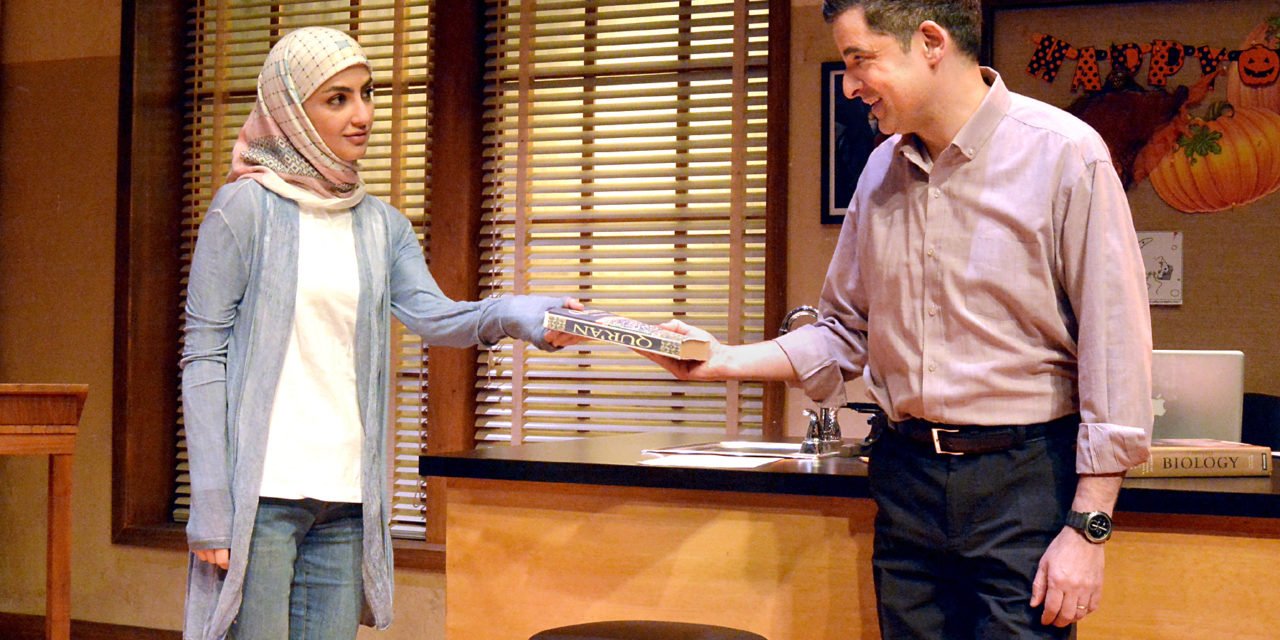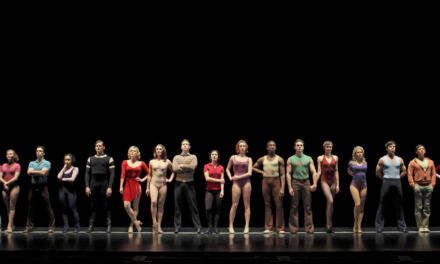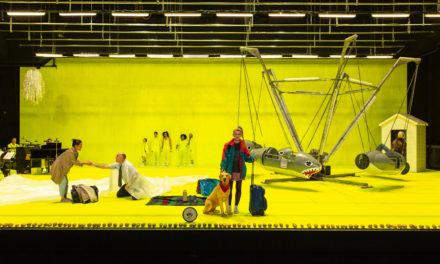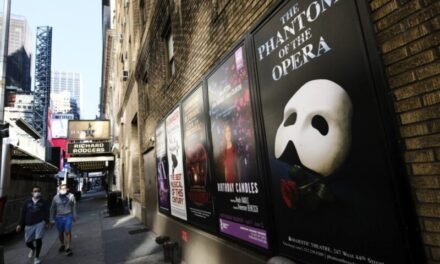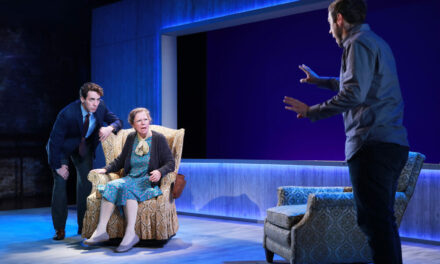Odyssey Theatre presents us with another thought-provoking play in Paradise by Laura Maria Censabella, directed by Vicangelo Bulluck and produced by Viola Davis and Julius Tennon via their company, JuVee Productions. The play was originally commissioned by Ensemble Studio Theatre and the Alfred P. Sloan Foundation and was a runner-up for the 2016 Saroyan/Paul Playwriting Prize for Human Rights.
One can see why for it centers on high school senior Yasmeen Al-Hamadi [Medalion Rahimi] and her almost desperate desire to get into Columbia University to study neuroscience. If the strict requirements for admissions weren’t enough, Yasmeen also needs a full scholarship and her less than inspired science teacher Dr. Guy Royston [Jeff Marlow] doesn’t hesitate to point out that she needs to have two lab classes to apply for one. As a senior – she has only ever enrolled in one – his. Energetic and determined, Yasmeen suggests he help her with a neurological study that could qualify as a second lab.
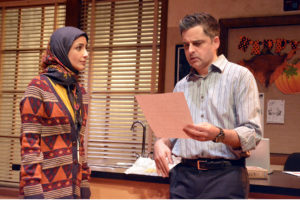
Medalion Rahimi and Jeff Marlow
Photo by Ed Krieger
Her hypothesis centers on love and the teenaged brain. Once a star scientist and teacher at Columbia, Dr. Royston has fallen as low as he imagines he can go after ruining his marriage via an affair with a colleague who left him for another colleague then married that man. Royston snapped and we eventually learn that there are still restraining orders out against him [it all comes out with a lot more humor than this paragraph implies]. Inspiration hasn’t come to visit this now less than enthusiastic high school teacher in the Bronx but Yasmeen’s proposal sparks his curiosity and he agrees to help.
The play unfolds over time in Dr. Royston’s classroom during Yasmeen’s free period but even though everything about their meetings is professional and above board, Yasmeen still has to sneak around to avoid being spotted. That’s because she’s a teenaged Muslim girl who is very aware that her reputation could be spoiled by even the slightest hint of gossip that could easily be generated by Muslim boys in school who are new to the US. Yasmeen has to hide her efforts from her community, from her family, and from the man that family has arranged for her to marry. This news unsettles Royston. He doesn’t come right out and call himself an atheist but he does state that he is not a believer and takes issue with her religion and culture.
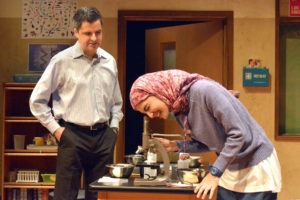
Jeff Marlow and Medalion Rahimi
Photo by Ed Krieger
He does it as respectfully as one can but he still challenges her decisions and tries to change her mind about the marriage, fearing her brilliant scientific mind will never get to thrive and grow. As he challenges her, Yasmeen develops her original hypothesis, adding a risk vs. reward element to their studies that gets Royston thinking this might be his ticket out of the neuroscience doghouse. He starts to distance Yasmeen from stages of the experiment and gets particularly determined to do so when she follows her own heart and instincts, defying his life plan for her. She is patient with him in ways all of us might learn from and even though he nearly leaves her behind entirely, he is ultimately motivated by his feelings for Yasmeen to let her move forward with the work, without him.
Those feelings might be mutual and one can easily surmise that Yasmeen’s questions about the lasting impact a first love has on a teenager have more to do with her own experience with Dr. Royston than it does with data sets but thankfully the play steers clear of all of the tropes you might expect from such a situation and keeps things focused on the science. Dr. Royston listens to her sing and admires her quotes from the Quran. On his own, he listens to the Quran and admits he finds it peaceful – that’s about as outward a gesture as we find from the man but it is a moving one.

Medalion Rahimi and Jeff Marlow
Photo by Ed Krieger
Jeff Marlow defines the word ‘comfortable’ on that stage in a charming performance that has us chuckling at moments other actors might not land so easily. Medalion Rahimi’s energy level never falters in her earnest attempts to get into the college of her dreams however those earnest attempts are most often illustrated by a repeated open palmed, fingers splayed gesture of determination that distracts from her performance. Props are plentiful in this very realistic grungy classroom of a set and often they cement the sense of the character and their reality but the rifling through piles of notebooks on Dr. Royston’s desk pull focus and the scene change time required to reset props in a messenger bag and backpack, change the date on the board and generally handle everything that is used sinks the momentum a bit, making us wondering what might have happened if all of those changes had been ignored in favor of letting the actors play and the audience’s imagination do the rest.
The award-winning creative team for Paradise includes scenic and lighting designer Jeff Rowlings, sound designer Jon Gottlieb, costume designer Mylette Nora and casting director Michael Donovan, CSA. Also on board are scientific advisor Colin Cox and cultural advisorRoxi-Rabab Muthana. The production stage manager is Jenine MacDonald and Racquel Lehrman, Theatre Planners is general manager. Paradise is executive produced by Viola Davis, Julius Tennon and John Cappetta; and presented by JuVee Productions and American Oasis.
JuVee Productions is an artist-driven entertainment company that develops and produces an independent film, television, theater, and VR and digital content across all narrative platforms. JuVee Productions seeks to produce sophisticated and character-driven stories with an emphasis on narratives from a diverse range of emerging and established voices alike.
Performances of Paradise take place Fridays and Saturdays at 8 p.m. and Sundays at 2 p.m., Jan. 26 through Feb. 17. All tickets are $35 (reserved seating) except previews, which are$25. The Odyssey Theatre is located at 2055 S. Sepulveda Blvd., West Los Angeles, 90025. For reservations and information, call (323) 960-7724 or go to www.Plays411.com/Paradise
This post was written by the author in their personal capacity.The opinions expressed in this article are the author’s own and do not reflect the view of The Theatre Times, their staff or collaborators.
This post was written by Christine Deitner.
The views expressed here belong to the author and do not necessarily reflect our views and opinions.

